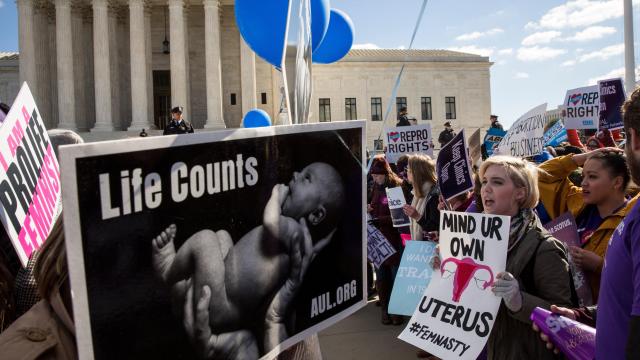A coalition of 17 state attorney generals are pressuring Google to prevent it from limiting the search results of so-called “crisis pregnancy centres” known for masquerading as legitimate abortion clinics and persuading pregnant people away from receiving abortions.
Critics warn unrestricted search results could steer abortion seekers toward these clinics, potentially putting their health at risk. Republicans, on the other hand, say efforts to limit those bad faith clinics in search results amounts to market discrimination against anti-abortion organisations.
In a letter spearheaded by Virginia Attorney General Jason Miyares, the Republican lawmakers pushed back against earlier pleas from Democrats and claimed Google’s decision to moderate its results, “would constitute a grave assault on the principle of free speech.” The Republicans then lashed out at previous Democratic efforts to pressure the company before proceeding to, seemingly unironically, threaten Google if they didn’t get their way.
“We wish to make this very clear to Google and the other market participants that it dwarfs: If you fail to resist this political pressure, we will act swiftly to protect American consumers from this dangerous axis of corporate and government power,” the lawmakers wrote.
If Google does opt to alter the search results, Republicans say they will conduct investigations to determine whether or not the actions violate antitrust or religious discrimination laws. In other words, don’t moderate your search results…or else.
Google did not immediately respond to Gizmodo’s request for comment.
Tuesday’s letter comes partly in response to a June study conducted by the Centre for Countering Digital Hate which found 11% of Google searches in trigger law states for the terms “abortion clinic near me” and “abortion pill” directed users toward so-called crisis pregnancy centres, which the CCCDH refers to as “anti-abortion fake clinics.” Google Maps results led users to that clinics 37% of the time. Though these organisations often present as neutral health clinics, critics say their main purpose is actually to dissuade women from going through with abortions. One of those critics is Massachusetts Senator Elizabeth Warren, who last month introduced a new regulation that would direct the Federal Trade Commission to prevent these clinics from engaging in misleading advertising.
“Anti-abortion fake clinics are the conversion therapy wing of an anti-abortion movement that is hell-bent on sending people to jail for abortion, miscarriage, and pregnancy,” Reproaction Co-Founder and Executive Director Erin Matson, said in a statement. “Misleading online advertising targeting abortion seekers is not a new concern, although it becomes more urgent as constitutional protections for abortion disappear.”
The Republican AGs aren’t necessarily wrong that limiting anti-abortion clinic searches would essentially discriminate against so-called pro-life groups, but that seeming market manipulation is also integral to how search engines fundamentally work. Google, and pretty much all other search engines, simply aren’t value-neutral. Google’s managed to entrench itself as a near search monopoly while amassing trillions of dollars in the process specifically due to its prowess at directing users to information that’s valuable to their queries. In the case of pregnant women searching for abortion services amid frantic legal uncertainty, anti-abortion clinics are possibly the least relevant result they cloud possibly be served.
Google has already shown some willingness to wade into the debate. Earlier this month, following weeks of uncertainty the search giant announced it would delete location history for people travelling to receive abortion services.
“If our systems identify that someone has visited one of these places, we will delete these entries from Location History soon after they visit,” Google said in a blog post.
